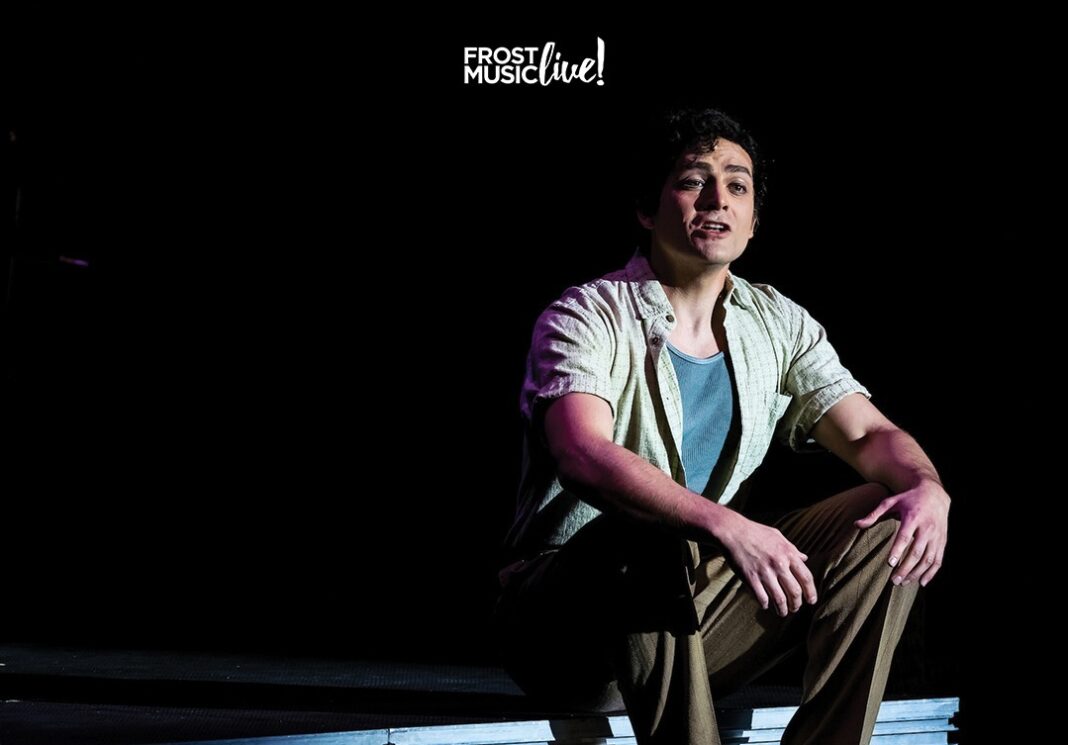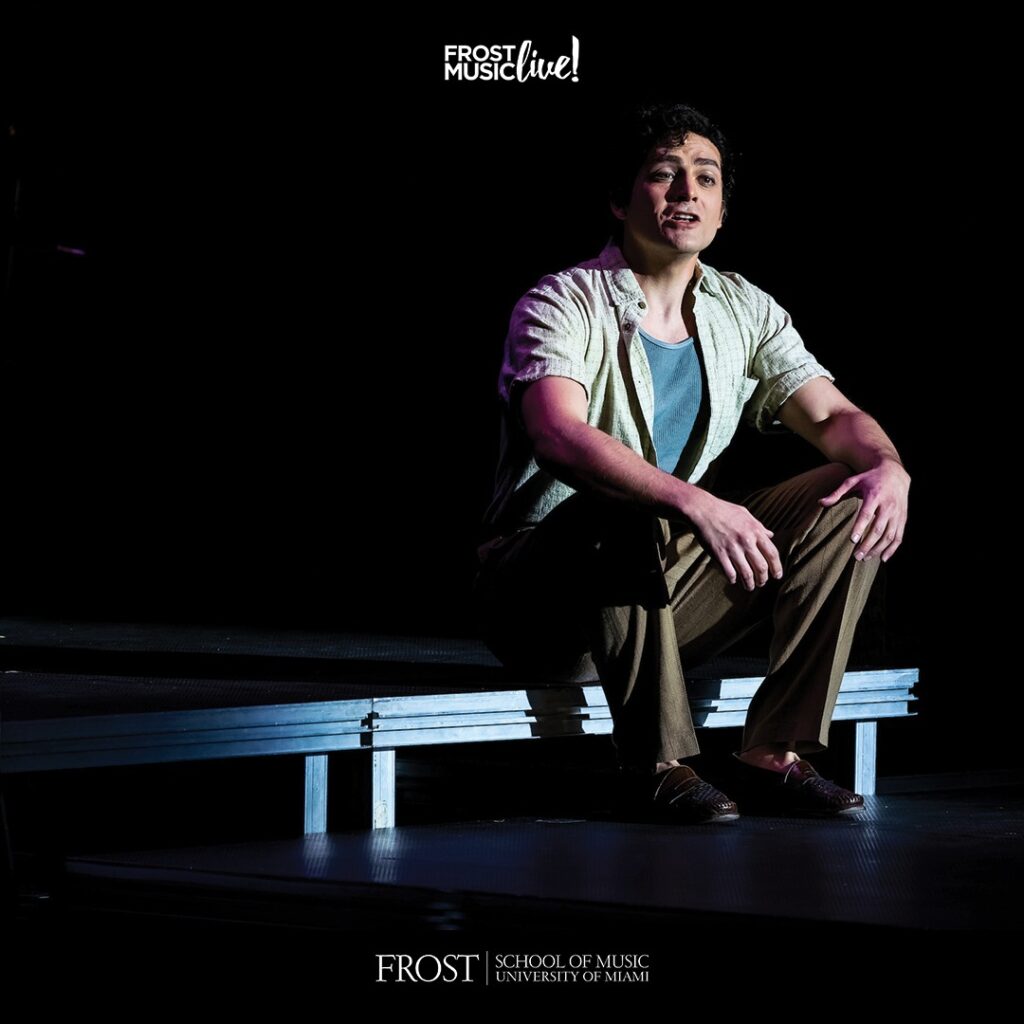

Set in the 1940s, the Frost Opera Theater brought a lively interpretation of Kurt Weill’s American opera, “Street Scene,” to the Gusman Concert Hall on Feb. 29 and March 4.
Cast member David Lee, who played the role of Frank Maurrant, defined “Street Scene” as “a combination of American musical theater plus European opera.”
Accompanying the opera was the Frost Symphony Orchestra, directed by first-year doctorate student Yun Xuan Cao. Cao admits this was his first time collaborating with the Frost Opera Theater, which gave him the opportunity to work with more musicians.
“Having the fun of making music with more people at the Frost school is what I love so much about this experience,” Cao said.
The Frost Symphony Orchestra complimented the cast members’ voices beautifully by matching the intense visuals. The result was an immersive, urban soundscape.
The opening scene begins with a scorching summer day in 1940’s Manhattan. Tenement neighbors sing at their porches as the heat overwhelms the apartments.
Created by Stephan Moravski, the set design and props brought a vivacious cacophonous neighborhood to life.
“The audience can look anywhere on the stage and get immersed in these one or two people’s stories and then shift over and see another story,” stage director Jeffrey Buchman said.
Having over 30 years of experience in the opera industry and seven years at the Frost Opera Theater, Buchman shared the positives of the directing side.
“The wonderful thing about directing is that I actually get to take every single character’s path,” Buchman said.
Although “Street Scene” was written in the 1940s, it is a parallel of today’s societal issues.
“All of the issues that they were dealing with at that time, we’re dealing with now,” Buchman said. “About a bunch of different ethnicities and cultures learning how to not only coexist, but to value and cherish each other.”
Throughout the opera, the Maurrant family is the talk of the neighborhood. Word spreads of a suspected affair between Mrs. Maurrant and the local milkman, Steve Sankey. Played by Josie Gore, a first year master’s student in vocal performance, the nurturing, yearning nature of Mrs. Maurrant was heart-throbbingly portrayed.
“She’s a very sweet woman. She loves her children more than anything in the world, and she just wants the world to be a better place and she’s hopeful for a better day,” Gore said.
Gore grappled with playing a woman trapped in an abusive marriage.
“Playing somebody who was in an abusive situation who cannot get out of that is just really hard for me, because women just couldn’t get out of that bad situation back then,” Gore said.
Rose Maurrant, Mrs. Maurrant’s daughter, struggles with similar feelings of limitations and barriers throughout the plot. Played by Rachel Wresh, a second year master’s student, the flirtatious young lady was a captivating emotional force throughout the opera.
“I think she’s a really strong and inspiring character just because she’s had such a tough situation,” Wresh said. “Even though the easy-out is put in her lap so many times, she makes the hard decision to go off on her own, figure out who she is and choose her own happiness.”
The violent domestic situation is prominently shown in the second act of the opera. Mrs. Maurrant and Mr. Sankey are caught by her husband, Frank Maurrant, proving the affair true. In a burst of anger, intoxication and violence, Mr. Maurrant shoots his wife and the milkman.
Portrayed by David Lee, Frank Maurrant is a violent, abusive husband struggling with alcohol addiction. Frank Maurrant argues to “let things be like they always was,” opposing the progressiveness and liberal perspective society was beginning to adopt.
“I think he’s a hardworking guy,” Lee said. “I actually like him because he wants the best for his family, but he is afraid that he might lose his wife and his kids. He’s losing control of his family.”
The emotional turmoil throughout the entire performance presented the cast members with difficult issues to bring justice to.
“We live in better times in general, so it’s hard to portray that genuine hostility that one may feel towards other groups of people,” Flores said. “It’s something that’s not easy to just go and portray.”
Wresh explained the difficulty of portraying the pain and betrayal Rose Maurrant felt following the murder of her mother.
“I have that realization on stage,” Wresh said. “I have a breakdown on stage. I’m crying and the whole town is around me. That’s a big theme in this story — that there’s always eyes on us.”
The diversity in characters and emotions truly came to life on stage, evoking laughter and gasps within the audience. Setting aside “Street Scene” from other operas, Kurt Weill’s fusions of musical genres permeate and showcase the immense talent of the cast and orchestra.
“What is so special about this piece and a lot of his works is the fusion of orchestral, operatic traditions with new American traditions as well,” Cao said.
Exploring and learning these musical fusions presented a challenge for the cast members taking its toll on the performers. Gore described her role as Mrs. Maurrant as physically- and vocally-demanding.
“The harmonies are so tight that it’s very difficult, and it’s something that I’m not the most comfortable with. It’s not the easiest and did not come naturally,” Gore said. “I had to work towards it.”
Each cast member brought a piece of themselves onto the stage of “Street Scene,” creating a memorable and everlasting performance.
“Every day was my favorite day,” Lee said. “This is a dream for me.”






